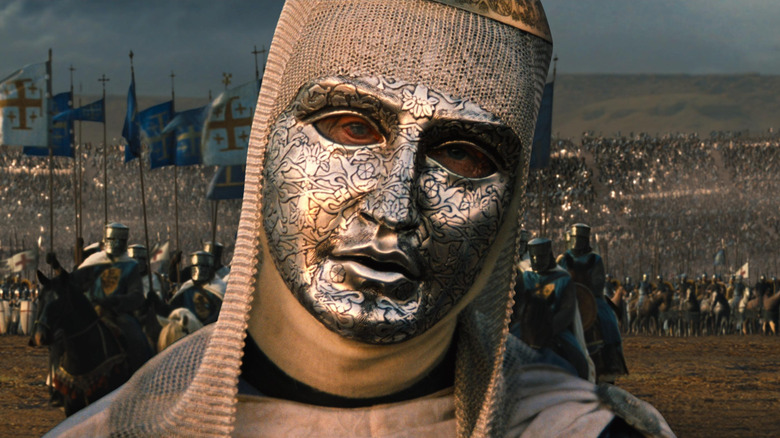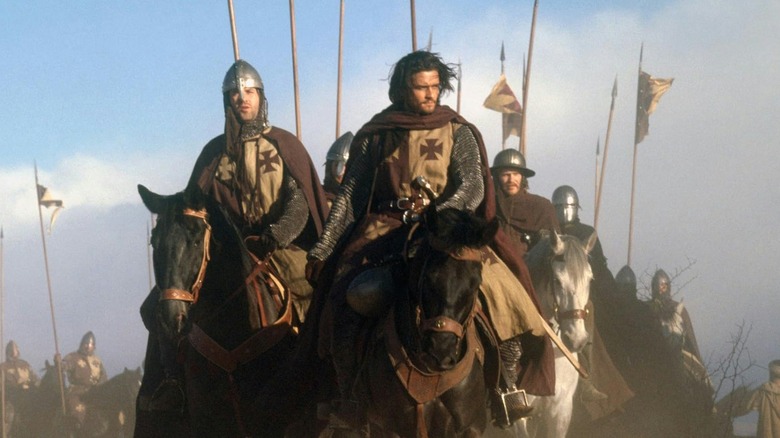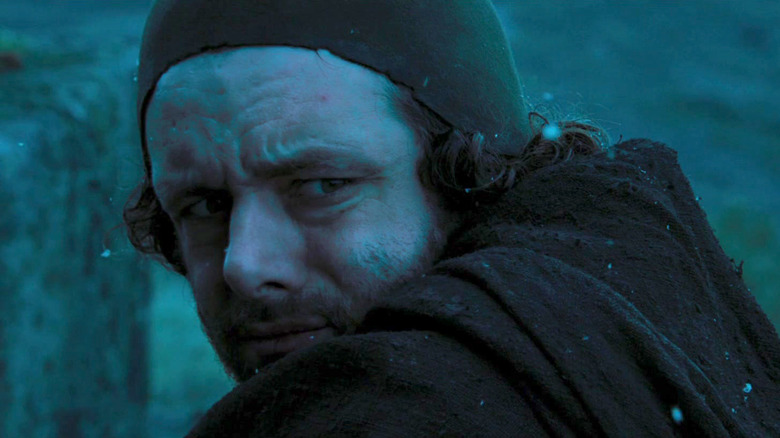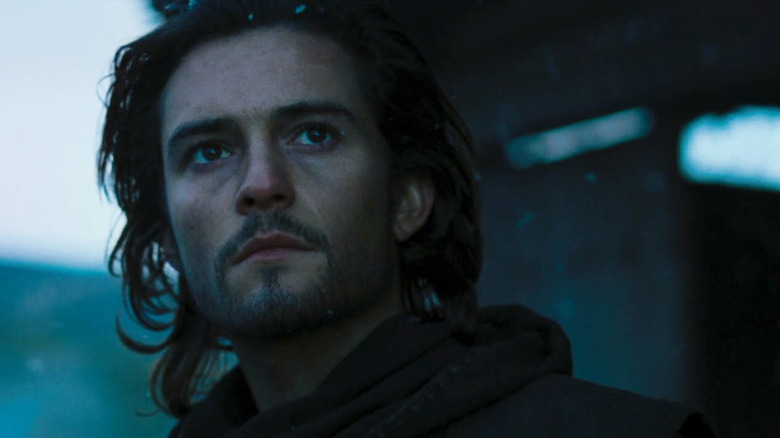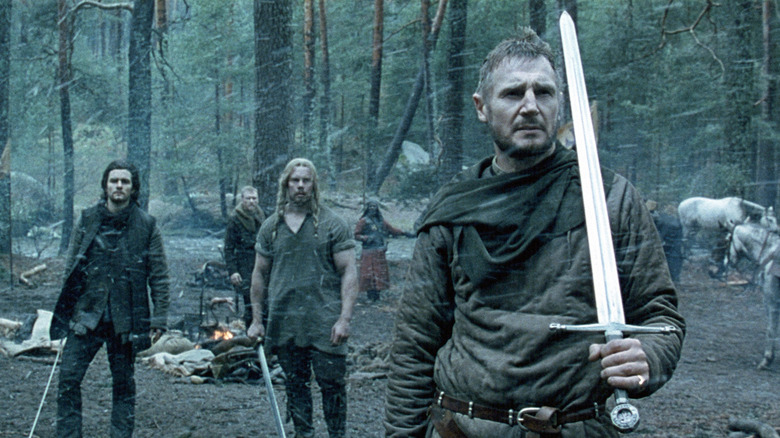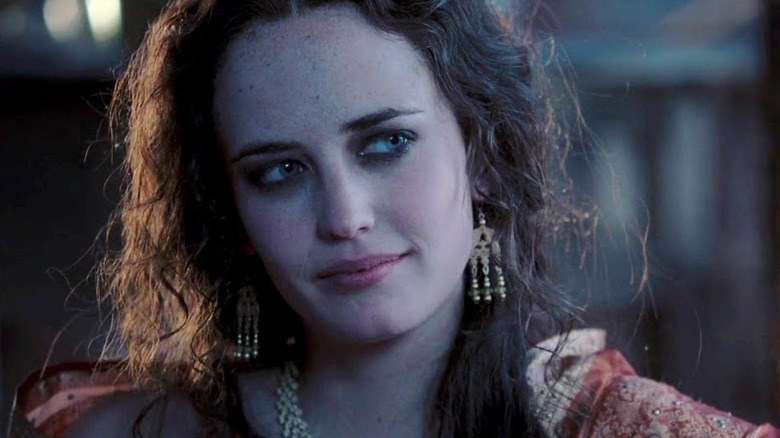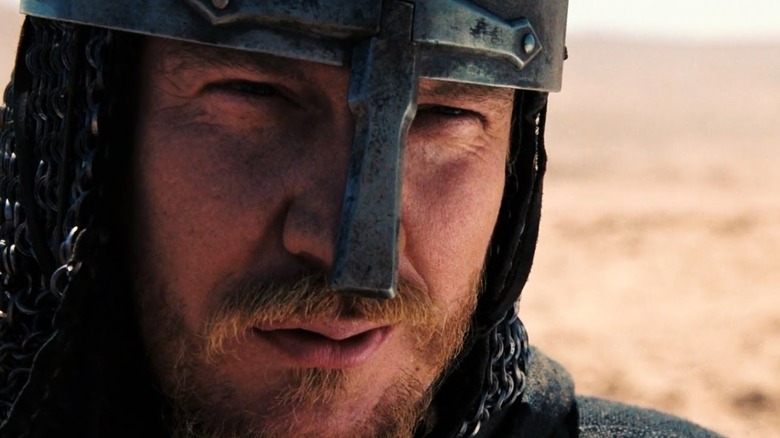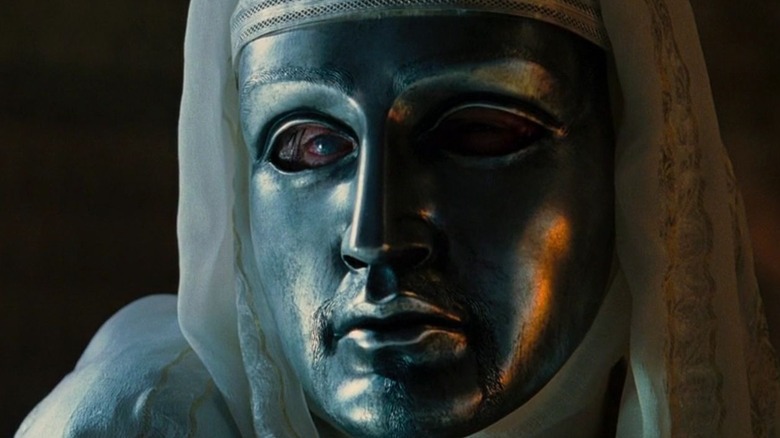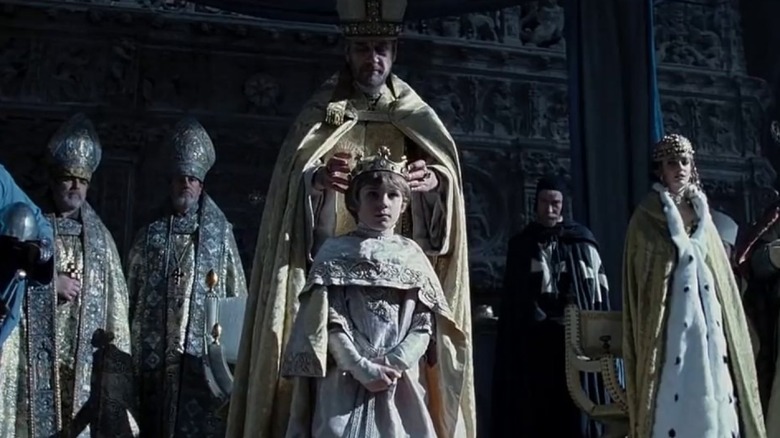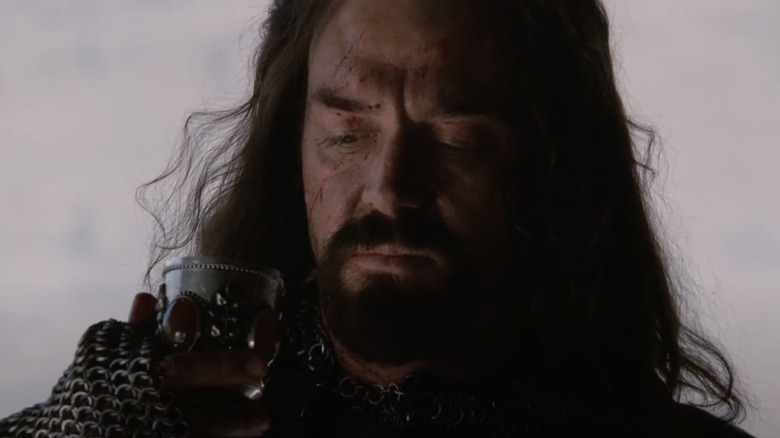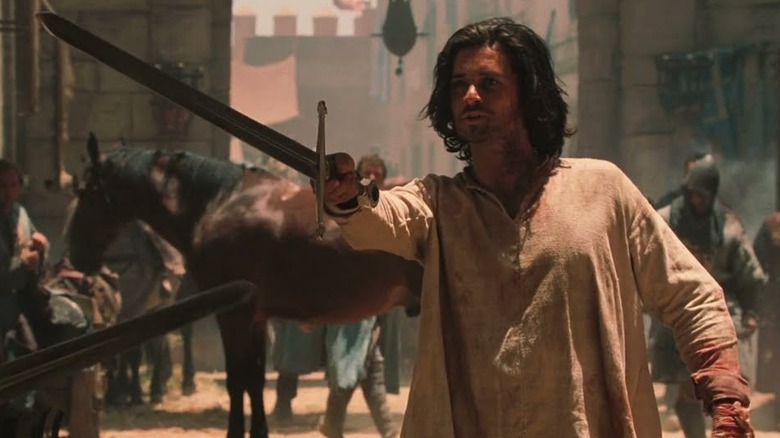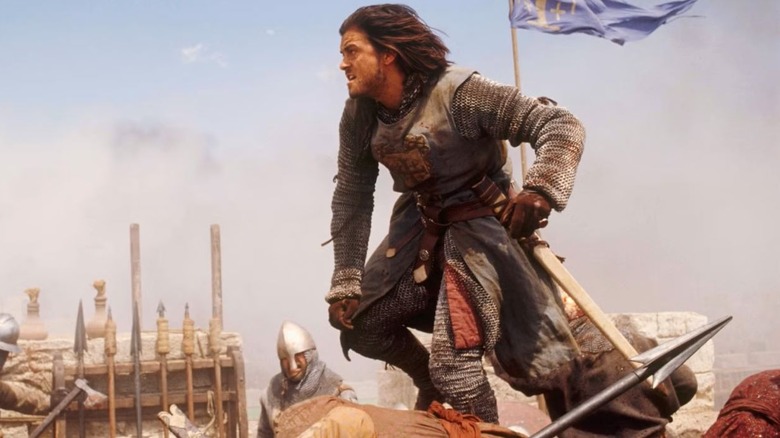Kingdom Of Heaven: The Differences Between The Theatrical & Director's Cut
When "Kingdom of Heaven" dashed into theaters in 2005, it carried an enormous amount of hype. Not only was it Ridley Scott's first full-blown epic since the box office and Oscar phenomenon "Gladiator," released five years prior, but it featured an astonishing cast — Orlando Bloom, fresh off "Lord of the Rings," Eva Green, Jeremy Irons, and Liam Neeson — boasted handsome production values, a terrific trailer, and an intriguing concept. Who didn't want to see the director of "Gladiator" tackle the Crusades?
Well, as it turns out, not too many people. "Kingdom of Heaven" cost a reported $110 million to produce (excluding publicity and advertising) and opened to a modest $19 million in the United States, en route to a disappointing $47.5 million domestic total. Ouch. Internationally, the picture fared better, collecting $171 million to raise its worldwide gross to $218 million — not terrible, but a far cry from "Gladiator's" impressive $451 million take. Moreover, critics weren't impressed with "Kingdom," with only 40% of critics awarding it a positive review on Rotten Tomatoes.
And that was that.
Except, as with several of Scott's lucrative filmography, a lengthier cut exists that delivers the epic motion picture everyone expected. Thankfully, by December of that same year, Scott, who regrets the theatrical cut, debuted the 194-minute "Director's Cut," to critical acclaim mere months after bombing at the box office. What changed? In case you haven't watched it already, here are the biggest difference in the newer edition. Read!
Better Editing and Pacing
Broadly speaking, the biggest issue with the theatrical cut of "Kingdom of Heaven" is that it tries to cram too much information into a two-and-a-half-hour runtime. Characters come and go seemingly without purpose, important scenes feel rushed, and the audience doesn't have time to absorb the film's complex religious themes or intricate plot mechanics.
Right from the start, we're introduced to Orlando Bloom's character, Balian, a blacksmith mourning his deceased wife. He meets his long-lost father, Godfrey (Neeson), has a run-in with a mad priest (Michael Sheen), and is quickly swept into a grand adventure that sees him ascend the political ladder faster than you can spell "Jerusalem." The film moves at a breakneck pace — audiences never get a sense of who these people are or what they want — before leaping headfirst into lavishly staged but emotionally hollow battle sequences.
By contrast, the Director's Cut adds 45 minutes of essential footage and, more importantly, slows down enough to let the story and characters breathe. Tense moments, such as political debates in Jerusalem or preparations for battle, are now able to build naturally, rather than cutting straight to the action. As a result, the massive set pieces feel more earned, and the film becomes a far more dramatic, emotionally resonant experience.
Extended Opening
"Kingdom of Heaven" originally opened with Michael Sheen's eccentric Priest watching two gravediggers bury the wife of Balian. We're given very little information before Godfrey de Ibelin and his Crusaders arrive. We then immediately cut to Balian doing his blacksmith thing, and we're off to the races.
The Director's Cut, however, significantly reshapes this opening. Not only do we get an overture, during which Harry Gregson-Williams' score sets the mood, but the Priest, who we later learn is Balian's brother — a detail left out of the theatrical cut — is given a lot more screen time and dialogue. A key change lies in the deeper thematic setup. The three characters discuss the logic of religion: whether a Christian woman who commits suicide deserves damnation, whether her grave must lie at a crossroads, and what role compassion should play in these judgments. The Priest then steals her cross necklace and then gives way to the Crusaders. In this version, one of Godfrey's men returns and offers a coin for the woman's soul, which the Priest naturally pockets for himself, thus showing how religious institutions often fail to live up to their own ideals.
Essentially, this is the point of the film, that true holiness, as the Hospitaler (David Thewlis) later explains, lies not in titles, institutions, or crusades, but in personal integrity and moral courage. The Director's Cut doesn't just expand the story; it reframes it with far greater philosophical weight and emotional resonance.
Balian's Backstory
A significant criticism of "Kingdom of Heaven" centered on Balian himself, who, in the Theatrical Cut, comes off as an emotional cipher. He's upset about his wife, certainly, but mostly plods through the film offering little emotional depth. Orlando Bloom's performance, even in the Director's Cut, is something of a mixed bag — stoic to a fault — but the extended version at least gives the character more gravitas.
Take his introduction, for example. In the Theatrical Cut, we meet Balian in his forge, aggressively blacksmithing. He says almost nothing and stares blankly at his long-lost father, Godfrey, when the older man arrives to whisk him away on a grand adventure. Balian declines the offer, returns to hammering metal, murders the priest, and then abruptly changes his mind to catch up with the Crusaders. It's rushed and emotionally shallow.
By contrast, the Director's Cut opens with Balian in jail, where he quietly reminisces about his pregnant wife. It's a rare moment of vulnerability — he even smiles faintly. After his release, he visits her grave, then later returns to his home, finds a tiny shirt, burns a baby cradle, and, only then, takes refuge in his blacksmithing.
Ultimately, this version allows us to better understand and even empathize with Balian. His grief feels real, his actions and silence more deliberate. It's not a radical transformation of the performance, but it's enough to lock the viewer in emotionally for the next three hours.
More Godfrey
Similarly, not much is known about Godfrey when he arrives at Balian's shack. Like his son, he's also stoic to a fault, and not particularly interesting outside of his crusader banner. He seemingly wanders into town and immediately bumps into his son, then leaves just as quickly. Later, he and his men are attacked by the village sheriff (played by Nikolaj Coster-Waldau, aka Jamie Lannister), who arrives to arrest Balian for the murder of the priest. Godfrey eventually dies from his wounds, a rather hollow character for Liam Neeson's star power.
Thankfully, the longer version restores an entire subplot in which Godfrey's men dine with the lord of the land, who happens to be his brother (Robert Pugh). Oh, and the sheriff is Godfrey's nephew. During this scene, the brother notes that Godfrey is a Baron of Jerusalem, and if he dies without naming an heir, his wealth and power will pass to him and eventually the sheriff, adding more resonance to the ensuing battle.
We also get a nice moment where Godfrey stares out of Balian's shop and sees himself with his wife in the same local long ago. And, like his son, he cracks a smile, displaying a shade of humanity beneath the tough exterior. These moments, however minor, help flesh out these people, making them more than just cardboard action heroes — we actually care about Godfrey when he dies, and lament what could have been between he and his son.
Balian as Lord of Ibelin
As the film progresses, Balian becomes lord of Ibelin, a small but strategically located lordship in the Kingdom of Jerusalem. Upon his arrival, he finds nothing but desert, as his father, Godfrey, was too busy tending to other matters to look after his land. Balian immediately orders his workers to find water and quickly turns this barren landscape into a budding oasis.
Meanwhile, Sibylla (Green, in a role that helped her get the gig in "Casino Royale") arrives and practically throws herself at Balian — for political purposes explained later. This rather important love story doesn't receive the attention it deserves in the theatrical cut and feels unusually stiff and awkward.
For the Director's Cut, Scott adds snippets of footage that flesh out not only the love story, but Balian's miracle work on the land. A brief sequence sees him enter his domain, where he pauses to note a mural of skeletons with the words "Such as we are, you will be" painted in Latin underneath. Sibylla later notices this same image but appears to glean a different interpretation from it. Balian does his irrigation thing, but this time we see a much longer process that simultaneously allows viewers to feel the passage of time. Additional scenes of he and Sibylla are included, notably an extended love scene that adds a little more spice to their relationship, making their love affair more organic than forced — crucial elements that pay off later in the picture.
Burning Bush
After Balian's heroic stand at Kerak Castle, stronghold of Reynald de Chatillon (Brendan Gleeson), the dying King Baldwin IV (Edward Norton) reveals his ulterior motive: to place Balian in charge of Jerusalem by marrying Sibylla, and giving her husband, Guy of Lusignan (Marton Csokas), the axe. Balian declines, as he does not want to be the cause of another man's death.
Less than 10 minutes later, Balian does a complete 180 and decides to defend Jerusalem from Saladin (Ghassan Massoud) without revealing his motivations — other than plot.
More scenes are added in the extended cut that steady Balian's transformation, notably a bit where he meets with the Hospitaler in the desert and considers the gravity of the situation. After tossing a rock at a bush, which catches fire — seemingly debunking the Moses myth with science, an idea Scott would later explore in the poorly cast "Exodus: Gods and Kings" and bold sci-fi epic "Prometheus" — the Hospitaler tells Balian his duty is to the people in the city, and then adds that he must go and pray for the strength to endure the upcoming reckoning caused by events 100 years prior. "The Muslims will never forget," he says. "Nor should they." Balian now understands the stakes should events unfold poorly — they do, and once Guy becomes king, Balian decides to protect the people of Jerusalem.
Oh, and a second bush catches fire, perhaps signaling the presence of a greater power ushering Balian to action.
Additional Moments with King Baldwin IV
One of the best parts about "Kingdom of Heaven" is Edward Norton's uncredited portrayal of King Baldwin IV. Hidden behind a mask as a result of leprosy, the wise and patient ruler calmly engages in quiet and polite conversation and manages to impress everyone he comes in contact with — including Saladin. Regrettably, he only appears in a few scenes, a fault the Director's Cut improves upon, albeit slightly.
Here, his first exchange with Balian is longer. In the theatrical cut, Baldwin discusses his plight, gives Balian some advice, and then sends him on his way. In the newer version, the king actively engages with Balian, asking him questions about his life and pressing him about combat strategy. Indeed, the pair spend the majority of the scene discussing a fortification plan. Balian shows his keen intellect for strategy and redesigns the tactics to resemble a star, making the fortress difficult to approach for opposing armies "without being exposed to fire from another part." Impressed, Baldwin then commands Balian to return to his father's house to protect the helpless along the Pilgrim Road, and throws out this new line: "Safeguard in particular the Jews and the Muslims. All are welcome in Jerusalem. Not only because it is expedient, but because it is right."
These additions demonstrate more of Baldwin's compassion for all people, and his open-mindedness to different opinions from those around him — a reflection of his nature as a truly great leader.
Sibylla's Son
The most significant change to "Kingdom of Heaven" in the Director's Cut revolves around Sibylla's young son, Baldwin V (Alexander Potts), a character completely removed from the theatrical version.
In the film released in theaters, Sibylla appears to be acting on her own accord, using Balian strictly as a means to keep Guy from attaining the throne. Ultimately, her plan fails: Guy gets the crown, goes to war with Saladin, and is quickly destroyed. Sibylla oddly cuts her hair and spends the remainder of the film in the lower bowels of Jerusalem, only reemerging at the conclusion to ride off with Balian.
Now, the Director's Cut restores a key component of her transformation: Baldwin V. We see glimpses of the young child throughout the picture, and Sibylla makes it clear that she's trying to protect her son from Guy. Balian ultimately rejects her hand in marriage, and then King Baldwin dies, thrusting Baldwin V to the throne. His reign is short-lived, however, as Sibylla discovers that he has leprosy. Not wanting her child to endure the same hardships as her brother, Sibylla poisons her son, consequently allowing Guy to seize the throne. Grief-stricken, Sibylla then cuts her hair and abandons her power.
Clearly, Sibylla is a much more complex and sympathetic character in the Director's Cut. Her story drastically reshapes the film and provides emotional resonance to the thunderous action that dominates the latter half.
Expanded Role for Guy of Lusignan
Guy of Lusignan likewise enjoys more screen time in the Director's Cut, shedding more light on his despicable nature. There's a great scene immediately following King Baldwin's appearance at Kerak where Guy catches Balian and Sibylla briefly locking eyes. Guy glares at Balian, a man he already despised, but now has ample reason to hate. Of course, moments later, we see Guy thrust himself onto another woman, revealing his indifference to Sibylla.
Another noteworthy addition sees Guy confront Sibylla, giving us a glimpse into their fractured relationship. Sibylla enters a room and sees her son playing with toys and is shocked to discover Guy lingering nearby. "These rooms are not yours," she snaps.
"One day I will be the husband I was commissioned to be," he replies, before threatening her, noting that while her lover, Balian, has a hundred knights and King Baldwin by his side, he commands the Jerusalem army. He asks for her love, and she quickly pushes him aside. An understanding must be achieved between them, he says — basically implying she must accept him as her husband or he guarantees a swift and bloody end to her son's reign. Later, following King Baldwin IV's death, Sibylla tells Guy: "If my son has your knights, you have your wife."
Ridley Scott likely cut all of these character beats for a swifter runtime, but without them, "Kingdom of Heaven" offers nothing of substance to viewers beyond its lavish visuals.
Final Fight Between Balian and Guy
Watching "Kingdom of Heaven" in theaters, viewers likely walked out wondering, What happened to Guy? He is the chief villain of the picture, conjuring war with Saladin purely out of spite. The last we see of him, he's riding atop a donkey with his hands tied behind his back and wearing what appears to be a dunce cap. And then he's gone, presumably killed off-screen. A bafflingly deleted scene answers this question.
After the battle, Balian cleans up and prepares to vacate the city with his people when Guy appears with sword in hand. "A perfect knight," he sneers. "Is that what you think you are?" The pair engage in furious combat, slicing and headbutting each other through a row of garments hung out to dry. Once again bruised and bloodied, Balian manages to overpower Guy, slicing him across the stomach. The villain collapses to his knees and beckons Balian to finish the deed. Balian, ever the righteous man, holds his sword up high — as he was taught by Godfrey's men earlier in the film — and says, "When you rise again — if you rise — rise a knight!"
It's a satisfying moment, if only because it allows Balian to conclude his personal rivalry with Guy, sending the treacherous former king to an uncertain fate.
Added Gore
Finally, the Director's Cut adds another component that should satisfy war enthusiasts: gore. Not that there wasn't an ample amount of bloodshed in the previous version. At any rate, Ridley Scott ups the carnage factor, adding splashes of blood here, a severed head there. During Guy's attack on the Muslim caravan, the man literally cuts a person in half!
In the opening act, following the attack on Godfrey's men, Scott reinserts a scene in which one of the Crusader knights executes a survivor by slamming the sharp end of a war hammer through his skull — it's pretty brutal in a "Braveheart" sort of way. Later, after Guy stabs Saladin's messenger in the neck, he follows through by chopping off the poor guy's head, shocking even Tiberias (Irons). In retaliation, Saladin does the same to Reynald after he lays waste to his army. In the theatrical cut, he slashes the man's throat and finishes the deed off-screen. We later see the back of Reynald's head on a spike when Balian and Tiberias arrive to inspect the massacre. In the extended version, we see Saladin slash off Reynald's head, and Scott focuses explicitly on his severed head atop the spike.
Following the Battle of the Wall, Scott includes shots of the dead, showing the toll this war has taken on the city. There's also the aforementioned showdown between Balian and Guy that's fairly grisly.
